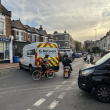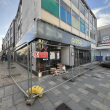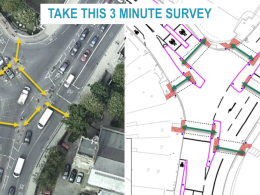This Thursday evening, Wandsworth’s Transport Overview and Scrutiny Committee will meet to discuss the Putney Bridge junction crisis. After a year of gridlock and with nearly 90 per cent of residents saying the situation has made their journeys worse, this meeting represents a critical moment for accountability and action.
Here’s everything you need to know about what’s happening, who’s involved, and how you can make your voice heard.

What is the Transport Overview and Scrutiny Committee?
Scrutiny committees are the council’s internal watchdogs. While the Executive (the council’s Cabinet) makes decisions, scrutiny committees examine those decisions, hold officials to account, and can recommend changes.
The Transport Committee specifically oversees all transport and highways matters in Wandsworth. They review major projects, examine spending, and investigate when things go wrong – like the Putney junction.
Crucially, scrutiny committees operate cross-party. Unlike Cabinet positions held only by the ruling Labour administration, scrutiny committees include both Labour and Conservative councillors, designed to provide balanced oversight.
Important: The committee cannot make binding decisions. They scrutinize and recommend, but the Executive (Cabinet) makes the final decision. However, their real power comes from asking tough questions, demanding answers, and creating political pressure through public scrutiny.
Who sits on the committee?
Ten councillors will determine how the council responds to the junction crisis:
Leading the meeting:
- Chair: Councillor Jack Mayorcas (Trinity ward, Labour): Also serves as the council’s “Active Travel Champion” advocating for cycling and walking infrastructure
- Deputy Chair: Councillor Sean Lawless (Tooting Broadway, Labour)
- Opposition Speaker: Councillor Daniel Hamilton (Balham, Conservative): Leads Conservative questioning
The Putney voice:
- Councillor John Locker (Thamesfield, Conservative): The only committee member representing a Putney ward directly affected by the junction
Other members:
- Councillor Annamarie Critchard (Tooting Bec, Labour): Previously questioned spending on Putney schemes
- Councillor Emmeline Owens (Northcote, Conservative): Raised concerns about congestion in June
- Councillor Leonie Cooper (Furzedown, Conservative): Also serves as the London Assembly Member for Wandsworth and Merton, giving her a direct line to Transport for London officials. Widely regarded as one of the few local representatives who can effectively engage with TfL at the highest levels
- Councillor Matthew Tiller (Roehampton, Labour)
- Plus Councillors Tony Belton and Caroline de La Soujeole
Also attending:
- Councillor Jenny Yates — Cabinet Member for Transport, who will answer questions and defend the council’s position

What Paper 25-398 says
Paper 25-398 [pdf] is the official report going before the committee Thursday. Understanding exactly what it says, what it admits, and what decision is being asked for is crucial.
What the paper reveals
The 24-page report, written by Nick O’Donnell (Director of Growth and Place), contains several important admissions:
The implementation failure:
- Signal timings “have not been implemented as modelled by AECOM and approved by TfL”
- The junction changes resulted in “unexpected congestion, particularly on Putney Bridge Road and Lower Richmond Road”
- Lower Richmond Road lost 10-12 seconds of green time compared to the approved model
- Putney Bridge Road lost 12-21 seconds of green time compared to what was approved
The financial impact:
- Original junction cost: £835,000
- Already spent on reviews this year: £100,000
- Additional costs needed: £250,000 for improvement measures
- Budget shortfall: £169,000 (to be funded from the council’s “approved General Fund Inflation budget”)
- Total spent/needed: Over £1 million
What has improved:
- Increase in cyclists (22%) and pedestrians (37%) using the junction from July 2021 (just before “Freedom Day” from COVID) to June 2025.
- Fewer pedestrians crossing on red lights (a safety improvement)
- Slightly faster journey times on the main north-south corridor (Putney High Street to Putney Bridge)
What has worsened:
- Longer journey times on Lower Richmond Road and Putney Bridge Road
- Buses starting journeys on these roads experiencing increased delays
- Unexpected congestion affecting local residents and businesses

What the transport committee is being asked to do
The paper asks the Transport Committee to:
- Recommend support to the Executive: The committee is asked to recommend that the Executive (Cabinet) approve the spending and actions
- Note the findings: Acknowledge the AECOM review and the admission of implementation failures
- Endorse continued work with TfL: Support ongoing collaboration with Transport for London to optimize signal timings
The specific ask is that the Executive approve spending the additional £169,000 on:
- Signal timing adjustments to give more green time to Lower Richmond Road and Putney Bridge Road
- Changes to pedestrian crossing sequences
- Further optimization work in collaboration with TfL
- Continued monitoring and potential additional changes

What the committee can actually do
Here’s the crucial part: the committee is a watchdog, not a decision-maker.
They cannot approve or reject the spending. Only the Executive can do that. What they CAN do is scrutinise, question, and recommend. Their power comes from asking tough questions in public and creating political pressure.
The committee’s options Thursday night:
Option 1: Recommend approval as written
- Support sending the proposal to the Executive unchanged
- This is what the council expects and wants
- Means minimal scrutiny before the Executive approves the £169,000
Option 2: Recommend approval with conditions
- Support the spending BUT add tough recommendations such as:
- Monthly progress reports back to committee
- Independent verification of any changes before implementation
- Mandatory resident consultation on any design changes
- Clear accountability measures and timelines
- Requirement for TfL officials to attend future meetings
- The Executive could accept or ignore these conditions
Option 3: Decline to support and demand more information
- Refuse to recommend approval until questions are answered
- Demand TfL officials appear to explain their role in the failures
- Call for an independent investigation before approving more spending
- Establish a Task and Finish Group to investigate properly
- The Executive could still approve the spending anyway, but would face political pressure
Option 4: Recommend significant changes
- Recommend a different approach entirely
- Demand proper consultation before any more money is spent
- Insist on external oversight of any changes
- Propose a fundamental redesign rather than incremental fixes
- Again, the Executive isn’t bound by this but faces scrutiny

What real power do they have?
The committee can:
- Demand answers from cabinet members and senior officers
- Examine evidence and highlight failures
- Call witnesses including TfL officials (though they can’t force TfL to attend)
- Commission investigations and establish task groups
- Add conditions to their recommendations
- Require the Cabinet to formally respond to their recommendations in writing
- Create political pressure through public scrutiny
- Expose problems that make it harder for the Executive to ignore issues
The committee cannot:
- Make or change policy
- Approve or reject spending
- Direct officers to take specific actions
- Overturn Executive decisions
- Force anyone to do anything
Why this still matters: The Executive can ignore the committee’s recommendations, but doing so after tough public scrutiny carries political cost. If the committee asks difficult questions and the answers are inadequate, that becomes part of the public record. If they demand accountability and the Executive refuses, residents know who to hold responsible.

What the paper doesn’t address
Crucially, Paper 25-398 avoids several key questions:
- Who is accountable? The paper doesn’t name who was responsible for implementing the wrong signal timings
- Why the delay? No explanation for why it took four months (June to October) to begin fixes after the problems were identified
- TfL’s role: Limited detail on how TfL approved a design that wasn’t properly implemented
- Resident input: No commitment to genuine consultation on future changes
- Long-term solution: The paper focuses on optimization of the current design rather than considering whether a more fundamental redesign is needed
This is where the committee’s scrutiny role becomes critical — they can demand answers to these questions and make it politically costly to ignore them.

Five crucial questions the transport committee should ask
Based on our investigation and reader survey, these are the questions that demand answers:
- “Who was responsible for implementing the wrong signal timings, and what consequences will they face?” The AECOM review found signals weren’t installed as designed. Someone made this error — who?
- “Why did it take four months (June to October) to begin fixing known problems?” The council knew by June the signals were wrong. Emergency fixes only started in October.
- “Will you commit to a full independent investigation with resident oversight?” 42% of survey respondents want a Task & Finish Group to investigate properly.
- “Why weren’t residents properly consulted, and will you commit to genuine consultation on any further changes?” 82% of residents say the lack of meaningful consultation was unacceptable.
- “Given TfL approved the faulty design, what assurance can you give that their oversight of fixes will be competent?” TfL signed off on the original failed implementation. Why should residents trust their judgment now?

How residents can participate
Attending in person:
- The meeting is at Wandsworth Town Hall, SW18 2PU
- Starts at 7:30pm Thursday 20 November
- Public gallery seating is available (first come, first served)
- Arrive by 7:15pm to ensure entry
Watching online:
- Meetings are webcast live at: wandsworth.public-i.tv/core/portal/home
- Recordings available afterward for those who miss it
Making your voice heard:
Before the meeting:
- Email committee members with your concerns (contact details on council website)
- Contact your ward councillor (best bet: John Locker, Thamesfield) to raise issues
- Share our reader survey results with councillors as evidence
Requesting to speak (deputation): Residents can request to address the committee directly, though time is now very limited. Requirements:
- You would need to send a request before 5pm today, Wednesday 19 November
- Email the Committee’s staff contact (in this case, Michael Flowers) with your name, contact details and a statement that sets out the reasons why you are looking to speak at the meeting and the particular points you would like to speak about.
- Provide the names of six but no more than ten supporters
- Be prepared to speak for up to 5 minutes
- You will then be contacted to have a meeting with the Cabinet Member for Transport (Cllr Jenny Yates) to discuss the matter further. She will ultimately decide whether to allow you to speak.
After the meeting:
- Follow up with councillors about their vote
- Submit Freedom of Information requests for documents mentioned
- Attend subsequent committee meetings to track progress

What happens next?
Possible outcomes from Thursday:
Best case scenario:
- Committee demands full independent investigation before supporting any spending
- Establishes resident oversight group
- Requires TfL attendance at future meetings
- Adds strict conditions to any recommendation including mandatory consultation
- Creates political pressure that makes it difficult for the Executive to ignore concerns
Likely scenario:
- Committee recommends approval of the £169,000 for immediate fixes
- Requests regular progress reports
- Some tough questions but no fundamental challenge to approach
- Recommendations go to Executive for approval
- Incremental improvements without addressing systemic failures
Worst case scenario:
- Quick recommendation to approve with minimal scrutiny
- No accountability for failures
- No meaningful conditions attached
- Another £169,000 spent with no guarantee of improvement
- Pattern of failed implementation continues unchallenged
The timeline ahead:
- Thursday night: Committee makes recommendations
- Within days: Executive decides whether to accept committee’s recommendations and approve spending
- December 2025: Interim safety audit due
- Early 2026: Any approved fixes implemented
- September 2026: Final safety audit with 12 months of accident data

Why this meeting matters
This is the only opportunity for democratic scrutiny before another £169,000 is spent on fixes that may not work. Even though the committee can’t block the spending, they can demand accountability and make it politically costly to repeat past failures.
The committee is being asked to recommend approval for more spending on the same approach that has already failed. They have the power to say “not without answers”: to demand proper investigation, require resident involvement, and attach conditions that create real accountability.
Your survey responses provide powerful evidence: 91% saying journeys are worse cannot be ignored. The committee needs to hear that residents want more than quick fixes; they want competent planning, genuine consultation, and real accountability.
Whether the committee uses its platform to challenge rather than rubber-stamp depends partly on them knowing residents are watching and expecting action. If they ask tough questions and get inadequate answers, that becomes part of the public record. If they demand accountability and the Executive refuses, residents know who’s responsible.

Get involved
Our coverage continues:
- Live updates during Thursday’s meeting on our Twitter/X feed
- Full analysis of outcomes Friday morning
- Ongoing investigation into the accountability questions
Share this guide with neighbors who need to understand what’s at stake.
Tell us what questions you want asked: news@putney.news
This is Putney’s chance to demand better. Make sure your voice is heard.









